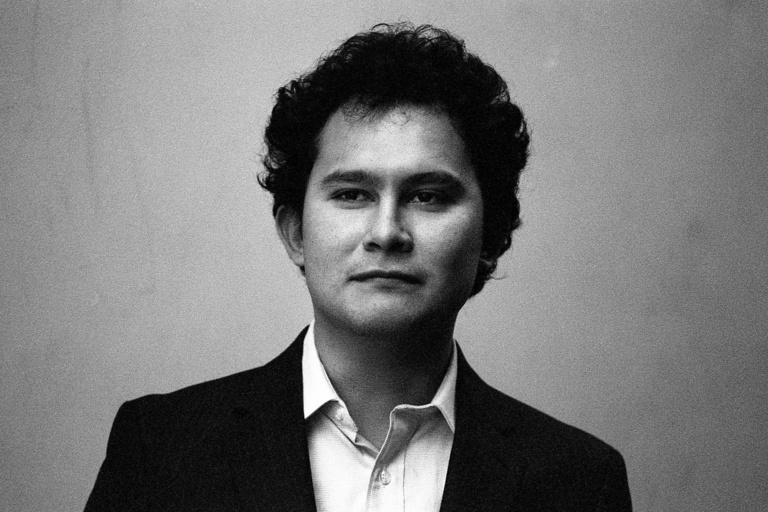Pedro García-Velásquez

Composer and co-artistic director of Le Balcon, Pedro García-Velásquez explores a variety of avenues of creative research, with a constant drive for experimentation and transgression. Winner of the 2016 Pierre Cardin Prize from the Académie des Beaux-Arts and the 2022 Musical Creation Prize from the Syndicat de la Critique, he is also keenly interested in the transdisciplinarity of the arts and sciences, seeing in music and its various parameters (timbre, rhythm, reflexes, etc.) a means of fundamentally exploring the Other.
Pedro grew up in Cali, Colombia, surrounded by natural parks, mountains, and rivers. He learned the violin from childhood and tirelessly saved his spare change to purchase a few records of the great pieces of the repertoire. At the age of fourteen, the young man began writing short jazz and baroque pieces. In high school, he was already pursuing advanced violin studies, and his encounter with a music theory professor, Alvaro Gallego, shaped his approach to music. Through a parallel study of a work by Colombian composer Cesar Potes and Stravinsky's The Rite of Spring, Pedro García-Velásquez suddenly became aware of what he called the "subterranean power of music" and decided to make composition his profession. After studying with Harold Vasquez-Castañeda, a professor at the Pontifical Javeriana University in Bogotá, Pedro entered the CRR in Boulogne, then the CNSM in Paris and studied with Frédéric Durieux, who encouraged him to reflect on the importance of complexity in his writing.
From this period came two fundamental insights: the search for a luminous and floating harmonic and timbral approach, similar to the French spectral movement; and the fascination with resonances, impact, and explosion, the unfulfilled expectation of something that never happens. Pedro wrote Esperando Llueva, which he recorded with Maxime Pascal at the Conservatoire, and Leve, reflejo, contracorriente, horizonte, two major pieces in his early career.
It was at the CNSM that Pedro and Maxime, along with four other students, founded Le Balcon, out of a collective desire to experiment and transform the concert experience. Within the collective, Pedro García-Velásquez found numerous partners with whom he would develop his ideas: computer music producer Augustin Muller, sound engineer Florent Derex, stage director Benjamin Lazar (Lieux Perdus), saxophonist Juliette Herbet (Juguemos), the unclassifiable Nieto (Scratched Shadows), cellist Askar Ishangaliyev (Moro de Venecia), and bassoonist Julien Abbes (Cras Lucebit, 2010). Pedro saw shared creation as a means of stimulating the expansion of imaginations. With Maxime Pascal, the dialogue was also enriched, particularly on ways to integrate fragments of the repertoire into contemporary writing. Since 2014, the Théâtre Acoustique series (which includes the pieces Lieux Perdus and Fête dans le vide) has been a way for him to explore the intricacies of consciousness and memory, and to work with new technological tools. With Augustin Muller and sound engineer Florent Derex, Pedro captures the acoustic imprint of dozens of locations (churches, ruined castles, etc.) to integrate them into the music he writes. These "lost places," whose acoustic essence is captured, evoke the abandoned sites of a Western civilization in an advanced state of decay.
Initio (2016), a choreographic opera co-written with Tatiana Julien, allows him to use a new material for him: the performer's body. In C'est déjà le matin (2016), co-written with Arthur Lavandier and Frédéric Blondy, Pedro creates a small, festive and bizarre mythological world, in which he immerses the spectator in the cloud of his surrealist ideas.
His current avenues of thought are numerous: among them, he attempts to redefine rhythmic writing that reflects the experiences he heard during his childhood in Cali, among the city's Black communities. Meeting newly arrived middle school students also sparked in him a desire to explore non-European melodic and rhythmic intuitions with them. "It's really the beginning," he says. He recently joined the EHESS (Economic School of Music and Social Sciences), where he now studies interactive ethnomusicology.